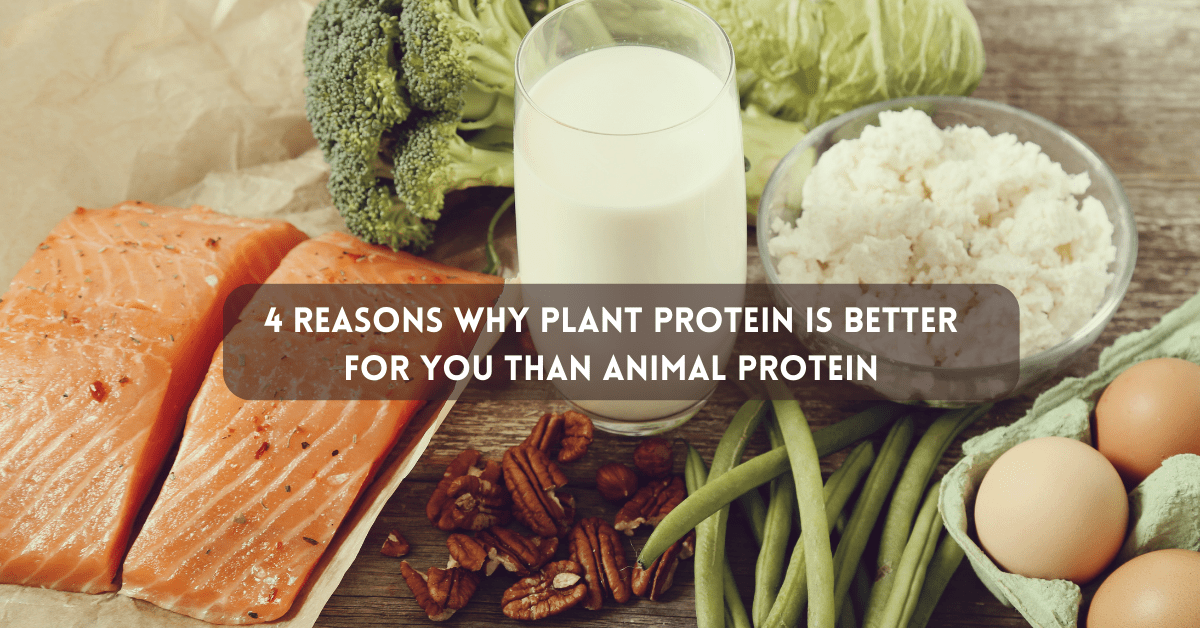People often argue about the pros and cons of protein from plants. People sometimes wonder if plant-based proteins are healthy or good enough to be a person’s only source of protein. Plant-based and vegan diets are becoming more and more popular, so it’s important to know reasons why plant protein is better for you.
What is plant protein?
Proteins derived from plants are called plant based protein. Even though all whole plant diets have some protein, some plants have more than others. It is widely accepted that nuts, seeds, and legumes are the best plant-based sources of protein. Additionally, there is a decent quantity of protein powder in whole grains. Veggies and fruits normally have less protein than other food groups, but there are some vegetables that have more protein.
What Is Animal Protein?
Animal protein is the protein found in animal products. In most cases, when people think of protein, they picture proteins derived from animals. Meat, fish, dairy products (milk, cheese, yogurt, etc.), and eggs are examples of such foods.
4 Reasons Why Plant Protein Is Better For You
1. Plant protein is more nutritious
It’s common knowledge that eating meat has numerous health benefits. You can get all the amino acids and vitamins you need to make your own body proteins by eating a wide variety of animal meats. This includes B12, niacin, thiamine, B5, B6, B7, and vitamins A and K. In terms of health benefits, there is no reason to eat meat if you can get the same variety of essential amino acids from nuts, seeds, and beans instead. This is due to the wide variety of nutrients that these foods provide. The most noticeable distinction is vitamin B12, which is not produced by most plants. Edible seaweed and fortified cereals are two natural food sources of B12, but taking a supplement or eating animal products is the most convenient method to acquire your daily dose.
2. Healthy fat with Plant Protein
Omega-3 fatty acids, which are beneficial to heart health, are commonly found in plant-based proteins. These fats have been shown to increase good cholesterol while decreasing bad cholesterol, which may help reduce the likelihood of developing heart disease. To show your heart some love, you can’t go wrong with plant protein. Maintaining cardiovascular health is a must for maximizing your workout potential and extending your workout time.
Read More
HOW DOES WHEY PROTEIN WORK IN YOUR BODY?
3. Very Rich in Phytochemicals!
Phytochemicals found in proteins derived from plants. Phytochemicals, sometimes known as “plant chemicals,” are compounds found exclusively in plant sources and are responsible for many of its healthful effects. Some of the advantages include protecting against heart disease and cancer, boosting your immune system, lowering your risk of osteoporosis and vision loss in old age, and decreasing inflammation in the body (inflammation has been linked to a wide range of diseases, including Alzheimer’s, cancer, diabetes, and depression). Phytochemicals have been shown to have positive effects on health, so it’s no wonder that scientists are still trying to determine how significant of an effect they have.
4. They Fill You Up on Fiber
Fiber, which can only be found in plant-based diets, is a true multitasker. Nonetheless, most people don’t consume even half of the recommended daily amount of fiber, despite its many health benefits. This simple protein source has a long list of health benefits, including the following:
Helps you stay regular, which is good for your colon’s health. Colon cancer rates are also lower in people who eat a lot of fiber. Reduces cholesterol by acting like a vacuum, encasing it in tiny packages that are then flushed out of the body. Protecting your heart health by reducing your cholesterol levels is a wonderful goal to strive for. Helps you feel full for longer, which helps reduce the likelihood of weight gain due to excessive eating. Reduces the rate at which food is digested, a key aspect in preventing and controlling type 2 diabetes because of its impact on blood sugar levels.
The Bottom Line
Plant-based proteins are a healthy alternative to animal protein in the diet. Consuming more plant-based protein sources can help with weight control, cancer prevention, heart health, and other conditions. Plant-based proteins also lack saturated fat and cholesterol, which are both unhealthy components of animal products.



